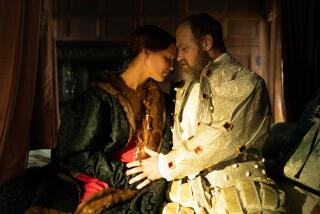Review: Peter O’Toole and Katharine Hepburn roar through the lovingly restored Oscar winner ‘The Lion in Winter’
- Share via
A classic from a bygone era, “The Lion in Winter” has got some years on it, but it can still roar when it counts.
A literate epic that utilizes both pageantry and splendid language, “Lion” — now digitally restored — was nominated for seven Oscars, including best picture, in 1969.
It took home three awards, including one for writer James Goldman, who adapted his own play involving power games and passionate verbal jousting within Britain’s royal Plantagenet clan in 1183.
As directed by Anthony Harvey, “Lion” is structured to favor the actors, and no wonder. The cast (which included future James Bond Timothy Dalton in his screen debut as France’s King Phillip II) was so strong that Anthony Hopkins, in his first major film, was billed sixth.

Good as those two are, the focus here, and the element of the picture that has aged not even a little bit, is the spectacular lead performances by Katharine Hepburn and an on-fire Peter O’Toole, two master battlers going at each other hammer and tongs like a 12th century version of “Who’s Afraid of Virginia Woolf?”
It’s O’Toole we see first, energetically encouraging his youngest son, the whiny teenage John (Nigel Terry), to come at him harder as they engage in a spirited bit of familial sword-fighting.
Burly, with a dark, full beard, O’Toole’s character is considerably different than the wispy Lawrence of Arabia he’d played six years earlier. Playing Henry II for the second time (after costarring with Richard Burton in 1964’s “Becket”), O’Toole almost defines larger than life as he strides through the film with energy and verve.
When Henry II exults in being “the greatest power in Europe in one thousand years” and exclaims, “I do love being king,” we absolutely believe him.
Delighted with his life though he is, the king does have a problem. Like Lear, he has three children and only one kingdom, an inheritance he complains “I can’t cut into bits.” Each of his three sons would like to succeed him, and he has to decide which one is to get the crown.
O’Toole is such a force as Henry that it’s hard to believe anyone could convincingly stand in his way, but that’s where Hepburn’s Eleanor of Aquitaine, his estranged queen, comes into the picture.
Estranged is actually a mild word for the relationship between these two. In fact, Henry is so fed up with Eleanor that he has kept her imprisoned in a tower for 10 years and has now taken up with Alais (Jane Merrow, best known for her TV roles), the sister of France’s Phillip II.
A Christmas event at the castle of Chinon is in the offing, including a visit from the French king to discuss which of Henry’s sons Alais is to marry to cement the relationship between the two countries.
Henry allows Eleanor to leave the tower to take part in the festivities, and once she shows up, the royal couple go at it fiercely as to who the new king is to be. Henry favors the scrawny John, Eleanor the brawny Richard (Hopkins), with third son Geoffrey (John Castle) having to be content with a possible behind-the-scenes role.
The dark fun of “Lion in Winter” is that, as impressively played by Hepburn (who won at Oscar for the role), Eleanor is fully Henry’s equal. We are invited to sit back and watch as these two and their offspring plot and scheme and verbally flay the skin off each other.
“Lion in Winter” boasts an Oscar-winning score by John Barry and is beautifully photographed by Douglas Slocombe in a series of striking castles, but it’s always the language, even at its self-consciously theatrical moments, that makes the most lasting impression.
“If you oppose me,” Henry says darkly, “I will strike you as only I can,” while Eleanor follows up a telling verbal blow with a waspish, “I was afraid that wouldn’t hurt.” It’s the queen who finally sums it up nicely. “What family,” she asks rhetorically, “doesn’t have its ups and downs.”
===
“The Lion in Winter”
Rating: PG
Running time: 2 hours, 14 minutes
Playing: Landmark’s Nuart, West Los Angeles.
See the most-read stories in Entertainment this hour »
Movie Trailers
More to Read
Only good movies
Get the Indie Focus newsletter, Mark Olsen's weekly guide to the world of cinema.
You may occasionally receive promotional content from the Los Angeles Times.











